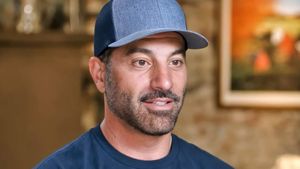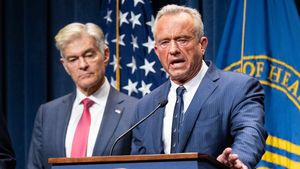CONTACTAbout UsCAREER OPPORTUNITIESADVERTISE WITH USPRIVACY POLICYPRIVACY PREFERENCESTERMS OF USELEGAL NOTICE
© 2025 Equal Entertainment LLC.
All Rights reserved
All Rights reserved
By continuing to use our site, you agree to our Privacy Policy and Terms of Use.
We need your help
Your support makes The Advocate's original LGBTQ+ reporting possible. Become a member today to help us continue this work.
Your support makes The Advocate's original LGBTQ+ reporting possible. Become a member today to help us continue this work.
The September 1967 debut of The Los Angeles Advocate (12 pages, 25 cents a copy) featured an upbeat tone, groundbreaking news of a federal court obscenity ruling on nude male images, and a cameo appearance by Leon Panetta, President Barack Obama's recent defense secretary nomination and current director of the Central Intelligence Agency, who congratulated CIA employees on Monday for their role in the successful mission leading to the death of Osama bin Laden in Pakistan.
Panetta, a 29-year-old fresh face on Capitol Hill in 1967 who would go on to become President Bill Clinton's chief of staff -- and who could succeed Secretary Robert M. Gates at the Defense Department before "don't ask, don't tell" repeal is formally certified -- met briefly that year with 11 California activists from the Third National Planning Conference of Homophile Organizations.
Wearing buttons reading "Equality for Homosexuals," the delegates had stopped by the office of California senator and Republican minority whip Thomas H. Kuchel, who was speaking on the senate floor at the time of their visit.
"[B]ut the group was received by a surprised assistant, Leon E. Panetta," the un-bylined report continued.
However "surprised" he may have been, Panetta didn't slam the door on the contingent in an era when homosexuality was considered pathology and the U.S. Civil Service Commission barred gays and lesbians from federal employment. "[He] showed interest in the homosexual movement and said that Senator Kuchel would read and digest any publications sent to him," the article read.
Following two years of service in the Army as a decorated intelligence officer, Panetta was hired as a legislative assistant for the Republican senator from California. But he became a Democrat in 1971, according to an interview available here via UC-Berkeley's Institute of International Studies.
The planning conference delegates also addressed the issue of gays in the military with Panetta, decades before "don't ask, don't tell" entered the American lexicon.
"On the issue of the armed forces, Panetta said that the Department of Defense would want evidence that homosexuals could be integrated into a military unit without downgrading its effectiveness," according to the article (the Los Angeles Advocate eventually shortened its title to The Advocate in 1970).
One study, completed a decade prior to the activists' 1967 Capitol Hill visit, would have helped provide such evidence -- if only it had been released. In 1957 the Secretary of the Navy appointed a panel to investigate the service branch's "homosexual exclusion policy."
The subsequent report, known as the Crittenden Report, found no evidence that gay service members posed a greater security risk than heterosexuals. But the report was not released until the 1970s under court order: The Navy had refused to release the study given its findings.
The delegates responded to Panetta that "many homosexuals, including several in the group talking to him, have served honorably and effectively during a time of war."
Following their meeting with then-legislative assistant Panetta, the 1967 delegate group visited the office of another California representative, one whose secretary, according to an eyewitness, was "overwhelmed by the masculinity" of those in attendance.
More than four decades later, many gay service member advocates have praised Panetta's nomination, though they have urged the Pentagon to certify repeal under the tenure of Secretary Gates, who will leave office on June 30 pending Senate confirmation of Panetta. "[Panetta] will bring a strong national defense background to the Pentagon, seasoned leadership, and a demonstrated commitment to equality dating back to his time in Congress," Servicemembers Legal Defense Network executive director Aubrey Sarvis said in a Wednesday statement.
On Monday, Panetta congratulated CIA employees for their "outstanding expertise, amazing creativity and excellent tradecraft" in eight months of intelligence work that led to the assault of a large compound in Abottabad, Pakistan, where bin Laden had been tracked down.
"We have struck a heavy blow against the enemy," Panetta said. "The only leader they have ever known, whose hateful vision gave rise to their atrocities, is no more. The supposedly uncatchable one has been caught and killed."
--
Editor's note: The Advocate wishes to thank Bob Witeck of Witeck-Combs Communications for bringing this early mention of Panetta in The Los Angeles Advocate to our attention.
From our Sponsors
Most Popular
Bizarre Epstein files reference to Trump, Putin, and oral sex with ‘Bubba’ draws scrutiny in Congress
November 14 2025 4:08 PM
True
Jeffrey Epstein’s brother says the ‘Bubba’ mentioned in Trump oral sex email is not Bill Clinton
November 16 2025 9:15 AM
True
Watch Now: Pride Today
Latest Stories
Health policy expert to RFK Jr.: You can't ban trans youth care this way
December 18 2025 5:37 PM
12 lesbian thrillers and mysteries to binge & where to watch them
December 18 2025 4:36 PM
Netflix's 'Boots' season 2 plot revealed by producer amid cancelation
December 18 2025 4:33 PM
Charlie Kirk's accused killer, Tyler Robinson, on LGBTQ+ issues: It's complicated
December 18 2025 4:04 PM
Sacramento man still in coma six weeks after suspected anti-LGBTQ+ hate crime
December 18 2025 1:17 PM
RFK Jr. and Dr. Oz announce sweeping measures to ban gender-affirming care for trans youth
December 18 2025 12:19 PM
True
Texas city will remove rainbow crosswalks under orders from Trump administration
December 18 2025 11:07 AM
Six key takeaways from Trump's speech to the nation, including 'transgender for everybody'
December 17 2025 10:51 PM
Marjorie Taylor Greene’s bill criminalizing gender-affirming care for minors passes with Democrats’ support
December 17 2025 6:47 PM
True
I didn’t just run the world’s major marathons. I changed them
December 17 2025 4:31 PM
Pam Bondi wants FBI to offer bounties for ‘radical gender ideology’ groups, leaked memo shows
December 17 2025 3:17 PM
Rock Hudson had a 'legendarily large penis,' Armistead Maupin says
December 17 2025 3:05 PM
Trending stories
Recommended Stories for You





































































Charlie Kirk DID say stoning gay people was the 'perfect law' — and these other heinous quotes